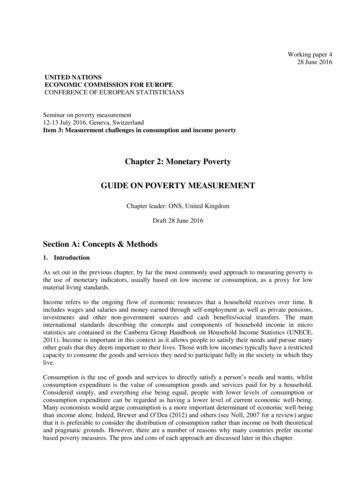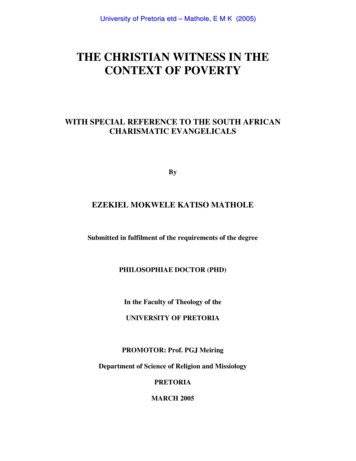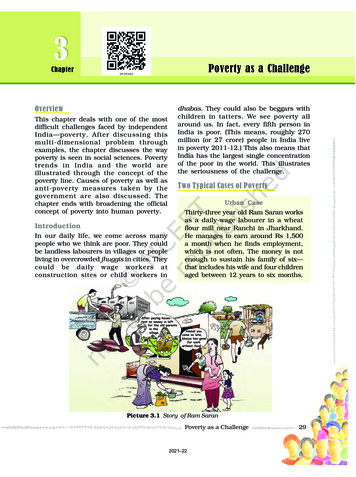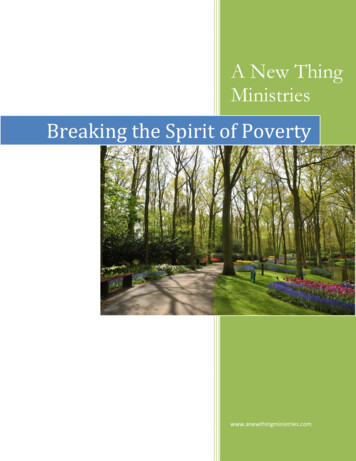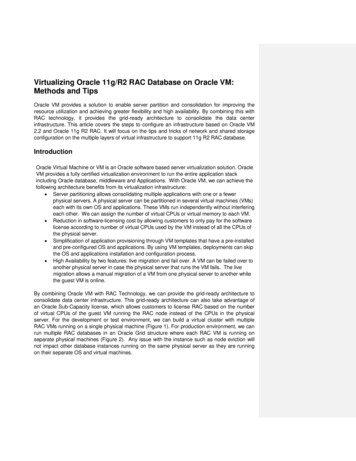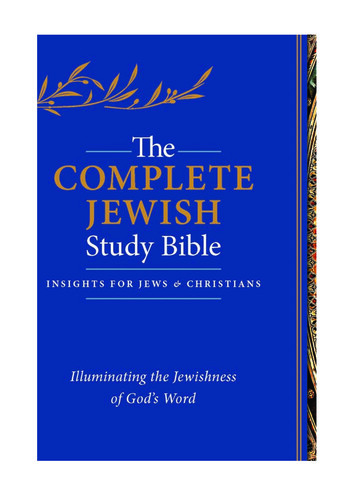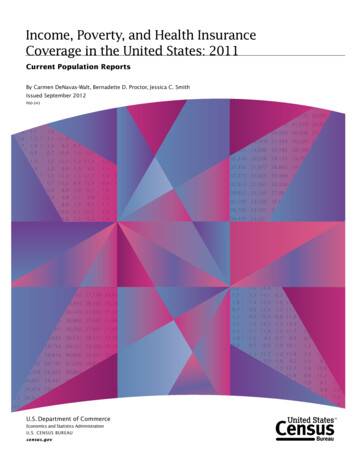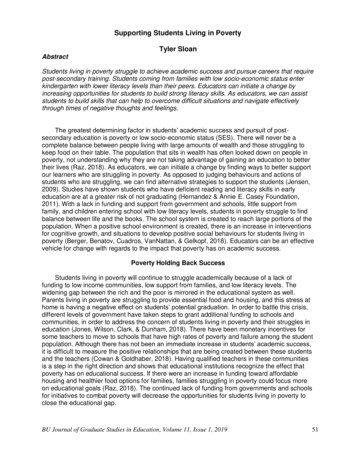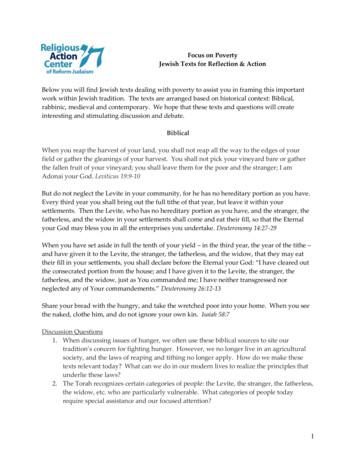
Transcription
Focus on PovertyJewish Texts for Reflection & ActionBelow you will find Jewish texts dealing with poverty to assist you in framing this importantwork within Jewish tradition. The texts are arranged based on historical context: Biblical,rabbinic, medieval and contemporary. We hope that these texts and questions will createinteresting and stimulating discussion and debate.BiblicalWhen you reap the harvest of your land, you shall not reap all the way to the edges of yourfield or gather the gleanings of your harvest. You shall not pick your vineyard bare or gatherthe fallen fruit of your vineyard; you shall leave them for the poor and the stranger; I amAdonai your God. Leviticus 19:9-10But do not neglect the Levite in your community, for he has no hereditary portion as you have.Every third year you shall bring out the full tithe of that year, but leave it within yoursettlements. Then the Levite, who has no hereditary portion as you have, and the stranger, thefatherless, and the widow in your settlements shall come and eat their fill, so that the Eternalyour God may bless you in all the enterprises you undertake. Deuteronomy 14:27-29When you have set aside in full the tenth of your yield – in the third year, the year of the tithe –and have given it to the Levite, the stranger, the fatherless, and the widow, that they may eattheir fill in your settlements, you shall declare before the Eternal your God: “I have cleared outthe consecrated portion from the house; and I have given it to the Levite, the stranger, thefatherless, and the widow, just as You commanded me; I have neither transgressed norneglected any of Your commandements.” Deuteronomy 26:12-13Share your bread with the hungry, and take the wretched poor into your home. When you seethe naked, clothe him, and do not ignore your own kin. Isaiah 58:7Discussion Questions1. When discussing issues of hunger, we often use these biblical sources to site ourtradition’s concern for fighting hunger. However, we no longer live in an agriculturalsociety, and the laws of reaping and tithing no longer apply. How do we make thesetexts relevant today? What can we do in our modern lives to realize the principles thatunderlie these laws?2. The Torah recognizes certain categories of people: the Levite, the stranger, the fatherless,the widow, etc. who are particularly vulnerable. What categories of people todayrequire special assistance and our focused attention?1
There shall be no needy among you—for the Eternal will surely bless you in the land that theEternal your God is giving you as an inheritance.For there will never cease to be needy ones in your land; therefore I command you: open yourhand to the poor and needy kin in your land. Deuteronomy 15: 4, 11If there is among you a poor person, one of your kin, in any of your towns within your landwhich God gives you, you shall not harden your heart or shut your hand against them, but youshall open your hand to them, and lend them sufficient for their needs, whatever they may be.Deuteronomy 15: 7-8Give to the needy readily and have no regrets when you do so, for in return the Eternal yourGod will bless you in all your efforts and in all your undertakings. Deuteronomy 15:10Anyone who withholds what is due to the poor blasphemes against the Maker of all, but onewho is gracious unto the needy honors God. Proverbs 14:31One who mocks the poor blasphemes one’s Maker. Proverbs 17:5Discussion Questions1. Explain the tension between Deuteronomy chapter 15 verses 4 and 11, found in the samechapter in Deuteronomy.2. If we accept an obligation to care for the needy in our society, does that mean that wehave to do it without regret for our own financial loss? Do you personally feel that youare able to give without regret or reticence?3. Again we see that our relationship with God parallels our relationship with thevulnerable members of society. Why are these two related?2
And if your neighbor becomes poor and his means fail him with you, then you shall strengthenhim, be he a stranger or a settler, he shall live with you. Leviticus 25:35Do not allow him to decline [socially and financially] and fall [altogether so that] it will bedifficult to restore him [to his original position], but strengthen him from the time of hisweakness. To what may this be compared? To a burden on a donkey: While it is still onthe donkey, one [person] may grab hold of it and hold up [the load, but if the donkey] fallsto the ground, five cannot raise it [the load] up. Rashi on Leviticus 25:35Judge the wretched and the orphan; vindicate the lowly and the poor; rescue the wretched andthe needy; save them from the hand of the wicked. Psalms 82:3-4Discussion Questions1. How can safety net programs (welfare, food stamps, Medicaid, etc.) fulfill Rashi’sdirective that we must catch people before they fall too far?2. When you work to assist the poor and vulnerable members of your community, do youhave a sense of the biblical imperative for your work? Why or why not?3
RabbinicGod says to Israel, “My Children, whenever you give sustenance to the poor, I impute it to youas though you gave sustenance to Me.” Does God then eat and drink? No, but whenever yougive food to the poor, God accounts it to you as if you gave food to God. Midrash Tannaim onDeuteronomy 15:10, citing Numbers 28:2When you are asked in the world to come, “What was your work?” and you answer: “I fed thehungry,” you will be told: “This is the gate of the Lord, enter into it, you who have fed thehungry.” Midrash Psalms 118:17HaLachma Anya, di achalu avahatana b’ar’a d’mitzrayim. “This is the bread of affliction ourancestors ate in the land of Egypt. Let all who are hungry come and eat; let all who are in needcome share our Passover meal.” Haggadah shel Pesach (Beginning of our Passover Liturgy)Discussion Questions1. How is our relationship with God impacted when we collect food for the poor? Do youfeel that you are building that relationship and, “doing God’s work” as you providesustenance for the hungry?2. Today when we open the door at our Pesach seder to invite in all those who are hungry itis often a symbolic gesture. We don’t expect that anyone will actually walk in off of thestreet. How can we use the holidays as a time to really reach out to those in need?“Follow the Lord your God” (Deuteronomy 13:5). What does this mean? Is it possible for amortal to follow God’s Presence? The verse means to teach us that we should follow theattributes of the Holy One, blessed be God. As God clothes the naked body, you should clothethe naked. Talmud, Sotah 14aWe have been taught: If a man who is in debt for a thousand maneh wears a robe worth ahundred maneh, he may be stripped of it. But he must still be provided with a robe that fits hisstanding, for, as we have been taught in the name of R. Ishmael and of R. Akiva: Everyone inIsrael deserves such a robe. Talmud, Shabbat 128aDiscussion Questions1. How does your clothing relate to your sense of dignity? When you see people on thestreet wearing dirty, torn clothes, how does that impact on you impression of them?2. Do you agree with the statement in Shabbat 128a? Why or why not?4
R. Abba said in the name of R. Simeon ben Lakish: the person who lends money [to a poorperson] is greater than the person who gives charity; and the one who throws money into acommon purse [to form a partnership with the poor person] is greater than either. Talmud,Shabbat 63bDiscussion Question1. Why is it more desirable to lend money than to provide charity?There is nothing in the world more grievous than poverty—the most terrible of sufferings. Ourteachers said: All the troubles of the world are assembled on one side and poverty is on theother. Midrash Rabbah Exodus 31:12Discussion Question1. Our early rabbis believed that poverty was the worst form of suffering. Do you agree?Why or why not?5
MedievalWhen you give food to a hungry person, give your best and sweetest food. Hilchot IssureiMizbayach 7:11Discussion Question1. Do you agree with the ruling found in Hilchot Issurei Mizbayach that you should “giveyour best and sweetest food” to the hungry? Shouldn’t it be enough to give even theleftovers from your meals? What message does this law send?If a community lacked a synagogue and a shelter for the poor, it was first obligated to build ashelter for the poor. Sefer ChasidimDiscussion Questions1. Here we see that there were many who believed that action was more important thanprayer. Is the same true today?2. Do our Jewish communities still place an emphasis on providing shelter for thehomeless? What are some ways we can do better?6
If a poor man requests money from you and you have nothing to give him, speak to himconsolingly. It is forbidden to upbraid a poor person or to shout at him because his heart isbroken and contrite for it is written, “To revive the spirit of the humble and to revive the heartof the contrite.” Isaiah 57:15; Maimonides, Mishneh Torah, “Gifts to the Poor,” 10:5Every city with even a few Jewish people must appoint tzedakah collectors, people who are wellknown and trustworthy, who will go door to door each week before Shabbat and take fromeveryone what they are expected to give. And they distribute the money before each Shabbatand give to each poor person enough food for 7 days – this is called the kupah.Collectors are also appointed to travel through public places to gather the bread and foodstuffsand fruits and money from whomever volunteers it, and they distribute it in the evening amongthe poor, giving each poor person enough to get through the day. Maimonides, Mishnah Torah,Laws of Contributions to the Poor, Chapter 9:1-2The highest form of charity is to step in with help to prevent a person from becoming poor.This includes offering a loan or employment, investing in a business, or any other form ofassistance that will avoid poverty. The basis for this principle is the commandment in ourpassage: you shall strengthen the poor. Maimonides’ commentary to Leviticus 25:35-38Discussion Questions1. Maimonides focuses on the feelings of the poor person. Do our current modes of givingconsider the emotions and dignity of the poor?2. We all know the parable: Give a man a fish, and he will eat for a day. Teach a man tofish, and he will eat for a lifetime. How does Maimonides’ emphasis on this idea relateto our soup kitchen donations? Creation of synagogue shelters?7
ContemporaryIn every Jewish city in the time of the Tannaim there were two institutions for tzedakah: publicfund (kuppah) and soup kitchen (tamchui). Introduction to Mishna Pe’ah 8:7 by Pinchas KehatiWe can see Joseph’s desire to see his impact beyond his own success, “to see God’s hand in hisascent, and to understand his success as being invested with the commandment to repair theworld.” As Egypt faced a massive famine, Joseph understood his role as one who couldimprove the lives of others. Like today’s MAZON and Hunger No More, Joseph is the“quintessential diaspora Jew engaged with the well-being of the Jewish world and non-Jewishworld.” Rabbi Andrew Bachman, Commentary on Parashat Vayigash, www.myjewishlearning.comHunger is isolating; it may not and cannot be experienced vicariously. He who never felthunger can never know its real effects, both tangible and intangible. Hunger defiesimagination; it even defies memory. Hunger is felt only in the present. Elie WieselDiscussion Questions1. What are some of the institutions that the North American Jewish community hasestablished to combat hunger? How are our communities different from those in therabbinic period and how have our safety net programs changed?2. When we look at the world around us and all of its problems, how can we avoid beingoverwhelmed? How can we truly believe that even one person, like Joseph, can make adifference and repair the world?3. What is Wiesel trying to impart to his reader? Do you think that an inability to trulyunderstand the pain of hunger should impact your response to it?There is no word in the Hebrew vocabulary for “charity” in the modern sense. The word usedis tzedakah, which literally means “righteousness.” Tzedakah is not an act of condescension bythe affluent toward the needy; it is the fulfillment of a moral obligation. Injustice to humanity isdesecration of God. Refusal to give charity is considered by Jewish tradition to be idolatry.Albert Vorspan and David Saperstein, Jewish Dimensions of Social Justice, UAHC Press, New York,NY, p. 93.Discussion Questions1. How is the word ‘idolatry’ being used here? Is it an appropriate usage of the word?2. Why isn’t there a Hebrew word for “charity”? What does it say about our religion thatwe are commanded to give tzedakah and not just when asked?3. What are some ways that we can ensure we always act “righteously,” both asindividuals and as a community?8
BE IT RESOLVED THAT the Union of American Hebrew Congregations:1. Calls upon our Reform congregations to increase aid to the homeless in four areas:A. To provide greater financial assistance to established shelters;B. To organize volunteers to assist in staffing these shelters on an ongoing basis;C. To offer the use of their buildings and resources to provide shelter, food, andclothing, as required; andD. To come together with other religious and communal institutions incoalitions to coordinate efforts and to provide maximum pressure on local,state and federal governments to take their fair share of responsibility for thehomeless; and2. Commends those congregations that have taken action to assist the hungry and thehomeless.From the 57th General Assembly of the Union of American Hebrew Congregations, Houston, TX,November 1983In Jewish law and in its implementation during the 1,500 years of the self-governing Jewishcommunity, the government and the public sector played a central role in achieving socialjustice. By talmudic times, at least four communal funds (food, clothing, burial, and moneyfunds), plus communal schools for all children, were required in every sizeable community.These programs were aimed at ensuring that the society as a whole fulfilled its moralresponsibility to help every needy person. By the Middle Ages, these had grown into a broadnetwork of social welfare institutions, serving children, the sick, the elderly, the hungry, therefugee—a social welfare system rivaling our own today, with extensive communal regulationof the environment, consumer rights, and worker’s rights.Statement by Rabbi David Saperstein, Director, Religious Action of Reform Judaism, on Welfare ReformReauthorization Proposals to the Human Resources Subcommittee of the U.S. House of RepresentativesCommittee on Ways and Means, April 11, 2001Discussion Question1. Do you feel that the Reform Movement in general and our congregation in particularhave done enough to fight poverty and assist the needy? How can we go beyond theefforts that are already in place?9
Jewish Texts for Reflection & Action . This includes offering a loan or employment, investing in a business, or any other form of assistance that will avoid poverty. The basis for this principle is the commandment in our . We can see Joseph’s desire to see his impact beyond his

